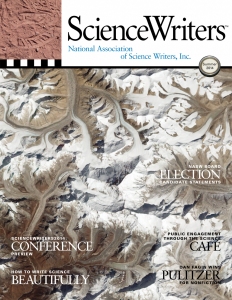Journalism can be maddeningly ephemeral. Days to months of reporting produce articles that spend a few weeks on the newsstand or just hours on a website’s home page. Then, poof! Old stories get buried by new ones. Readers are lost before they even had a chance to lay their eyes on what you wrote. It doesn’t have to be that way, says David Wolman, a freelancer in Portland, Ore., who has compiled a selection of his own articles and a few book chapters into a re-mastered collection that he has self-published digitally. The final product, which spans more than a decade of work, is called Firsthand. Wolman says the project holds lessons for all freelancers.
Q: (Your book) Firsthand: Why?
A: As professional writers, we are so busy battling deadlines, pitching ideas, and developing projects that there is little time to reflect on the work we’ve long since filed. On an NASW panel a few years ago about the pros and cons of specialization, I put myself out there as an unabashed generalist. That discussion forced me to think more about my sensibilities as a journalist and author, and to look at the work I’ve done in a more — hate this word — “holistic” way. That is partly what led me to this idea of gathering together some of the stories I’m most proud of, injecting them with new energy, and then re-releasing them as a compilation. I also wanted to finally have a single product that I can point people toward when they ask where to go to read my stuff.
Q: How did you do it?
A: I built it using a digital publishing platform called Creatavist. It’s super easy to use. I may write for Wired, but I’m not very techie. Like, not at all. Because these stories were originally published elsewhere, I was determined to offer the reader something more — a reading experience that is genuinely different. Extras include maps, photos, videos, and postscripts that provide recent news about people in the stories or behind-the-scenes happenings. Firsthand is also available on Kindle and other devices, but some of the multimedia extras aren’t available there. It looks prettiest on Creatavist.
Q: Inquiring freelancers want to know: Can you make any money from a project like this?
A: This collected-works model, or some future iteration of it, could provide long-tail revenue for writers. I may be wrong, and it’s certainly easy to assert that with so much free content on the web people simply won’t pay for something like this. But I’m not convinced, or I’m too stubborn to agree. Besides, startups like Atavist, Byliner, Matter, Epic, Longform, and others signal an unyielding enthusiasm for narrative features and, crucially, at least some willingness on the part of readers to pay for quality work. Will they pay enough to support these businesses? Beats me. But I’m not trying to launch a business, rent downtown offices or make payroll. I just want to better connect with readers who know me and my stuff, maybe find some new readers, and possibly earn some money that I can redirect toward my next writing project.
Q: Are you trying to start a trend: power to the little people?
A: Should others do this? Absolutely. One early point of caution is to select just the right stories to include. Shoveling in almost everything you’ve ever done would be the collected-works equivalent of ballot box stuffing. But yes, I think everyone should do this. People in our field are always griping about money. And they have a right to. It’s incredibly difficult to piece together a living as a writer if your last name isn’t Gladwell. The e-anthology idea is cool because it represents a possible new arrow in your quiver. And even if it doesn’t deliver the income you had hoped, you’ve built something that has non-monetary value. What’s the disincentive? Almost none.
Over at Medium, Wolman offers a practicum for writers who want to follow in his footsteps. In his words:
- Go to the articles page on your website. Gather together some favorites. Be selective; less is often more. If you have a book or some books, grab a few chapters.
- Sort out rights. What articles do you own? Which ones could you reprint or republish? Even if you don’t own rights to book content, maybe your publisher will permit use of the material for this purpose. (Thank you, _Perseus!_)
- Add value. I’m a big fan of Creatavist, but the goal is the same no matter the production tool: a smooth reading experience with carefully selected extras seamlessly woven into the prose.
You’re done. Now share it!
“ Q&A: David Wolman on His New Compilation Project —Firsthand,” PitchPublishProsper.com, May 16, 2014. To learn more about Firsthand, contact Wolman at david@david-wolman.com.
Emily Sohn covers health, the environment, adventure, food, and the science behind current events from her home base in Minneapolis.




